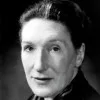In vain do they think themselves innocent who appropriate to their own use alone those goods which God gave in common; by not giving to others that which they themselves receive, they become homicides and murderers, inasmuch as in keeping for themselves those things which would have alleviated the sufferings of the poor, we may say that they every day cause the death of as many persons as they might have fed and did not.
Gregory I (c. 540 - 604) Bishop of Rome, liturgist, Latin Father, Doctor of the Church [Gregorius I, Saint Gregory the Great, Saint Gregory the Dialogist]
(Attributed)
(Source)
Quoted in George D. Herron, Between Caesar and Jesus, ch. 4 "Christian Doctrine and Private Property" (1899).
Quotations about:
in common
Note not all quotations have been tagged, so Search may find additional quotes on this topic.
The need for a body of common knowledge and common reference does not disappear when a society is largely pluralistic, as ours has become. On the contrary, it grows more necessary, so that people of different origins and occupation may quickly find familiar ground and, as we say, speak a common language. It not only saves time and embarrassment, but it also ensures a kind of mutual confidence and good will. One is not addressing an alien, blank as a stone wall, but a responsive creature whose mind is filled with the same images, memories, and vocabulary as oneself.
That is part of the beauty of all literature. You discover that your longings are universal longings, that you’re not lonely and isolated from anyone. You belong.
F. Scott Fitzgerald (1896-1940) American writer [Francis Scott Key Fitzgerald]
Comment to Sheilah Graham (c. 1938)
Quoted in her book, Beloved Infidel: The Education of a Woman, ch. 22 (1958). Variant, in the 1959 film adaptation of the book:The beauty of literature is that it’s ageless. You discover that your longings are universal longings, that you’re not lonely and isolated from anyone. You belong.
See also Baldwin.
More discussion of this quotation: That Is Part of the Beauty of All Literature. You Discover that Your Longings Are Universal Longings – Quote Investigator.
A novel which survives, which withstands and outlives time, does do something more than merely survive. It does not stand still. It accumulates round itself the understanding of all these persons who bring to it something of their own. It acquires associations, it becomes a form of experience in itself, so that two people who meet can often make friends, find an approach to each other, because of this one great common experience they have had.
I never met a man I didn’t like.
Will Rogers (1879-1935) American humorist
Motto
(Source)
Rogers' first use of the phrase in writing comes from "Letters of a Self-Made Diplomat to His President," Saturday Evening Post (1926-11-06):I bet you if I had met him and had a chat with him, I would have found him a very interesting and human fellow, for I never yet met a man that I dident like. When you meet people, no matter what opinion you might have formed about them beforehand, why, after you meet them and see their angle and their personality, why, you can see a lot of good in all of them.
(Misspelling of "didn't" in the original.) Rogers was writing of his regrets over not having met Leon Trotsky while visiting the Soviet Union. The article was incorporated into a book Rogers published about the trip, "There's Not a Bathing Suit in Russia & Other Bare Facts, ch. 4 (1927).
Two other early references, the first from his "Weekly Article" column (1930-06-29):You know I have often said in answer to inquiries as to how I got away with kidding some of our public men, that it was because I liked all of them personally, and that if there was no malice in your heart there could be none in your "Gags," and I have always said I never met a man I didn't like.
And from a speech at a Boston church, the same month:I’ve got my epitaph all worked out. When I’m tucked away in the old graveyard west of Oologah [Oklahoma], I hope they will cut this epitaph -- or whatever you call them signs they put over gravestones -- on it, 'Here lies Will Rogers. He joked about every prominent man in his time, but he never met a man he didn’t like.'
That reference was picked up in AP news stories, and Rogers used the phrase for the rest of his life.
More info on Rogers' motto and the above quotations: here, here, and here.






